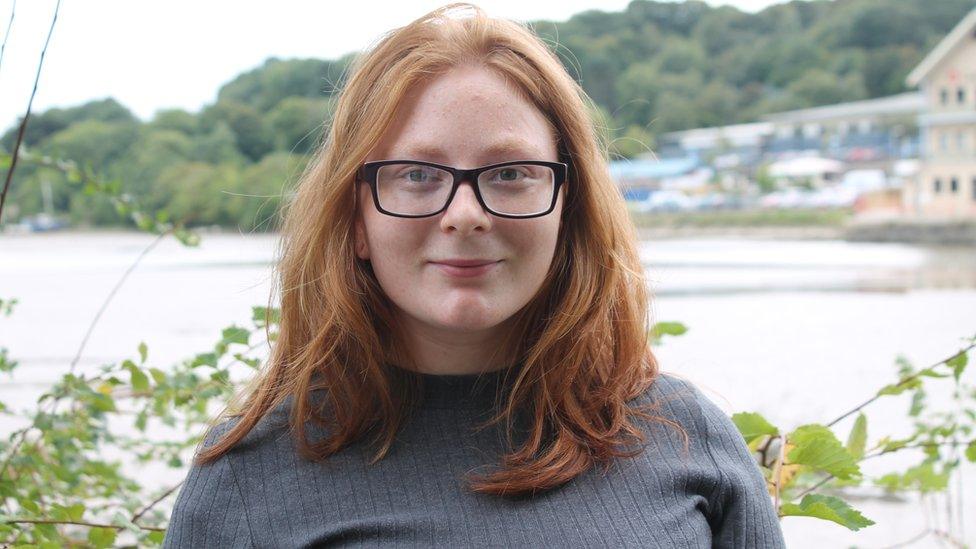Why harbour master Georgina Carlo-Paat spent her life at sea
- Published
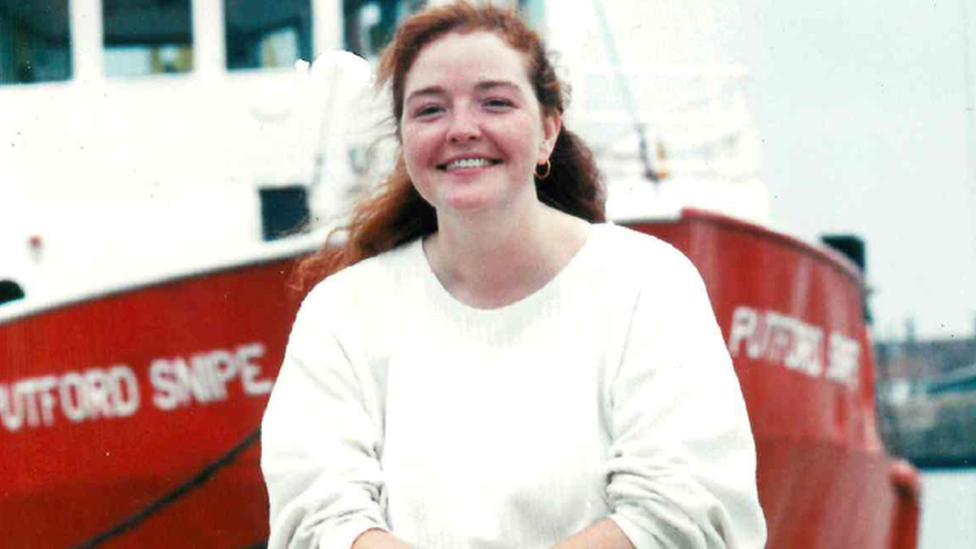
Georgina was a 21-year-old waitress working in a restaurant in Gibraltar when she joined the crew of a ship
What is it like to spend your life at sea? Georgina Carlo-Paat describes how she went from ship cook to the dredging industry's first female captain - a varied career during which she has watched penguins play on icebergs, eaten lobster in a Russian nightclub after a spell in the Baltic, and become Ilfracombe's first woman harbour master.
I was a waitress working in Gibraltar in 1990-1991 when the captain of a ship came into the restaurant and said he was in need of a cook. So long and short, I joined the USS Gopher State and sailed to Saudi with them.
It was full-on getting to know how the ship worked, the crew, how to make grits and eggs six different ways. It was exhilarating, fun and scary at times. But I fell in love with it. Even though you are doing the same thing every day, the sea is completely different.
I loved the camaraderie among the crew, because really you are just floating on a steel box on the sea. I thought... this is all right, getting to see the world and getting paid for it. It totally changed my perspective on what choices I had in life.
Afterwards, I went to the United States and visited some of the shipmates I had made. One of the mothers was working for [shipping company] Maersk and she said if I really wanted to join the merchant navy, I should go back to England and get properly qualified. So I did.
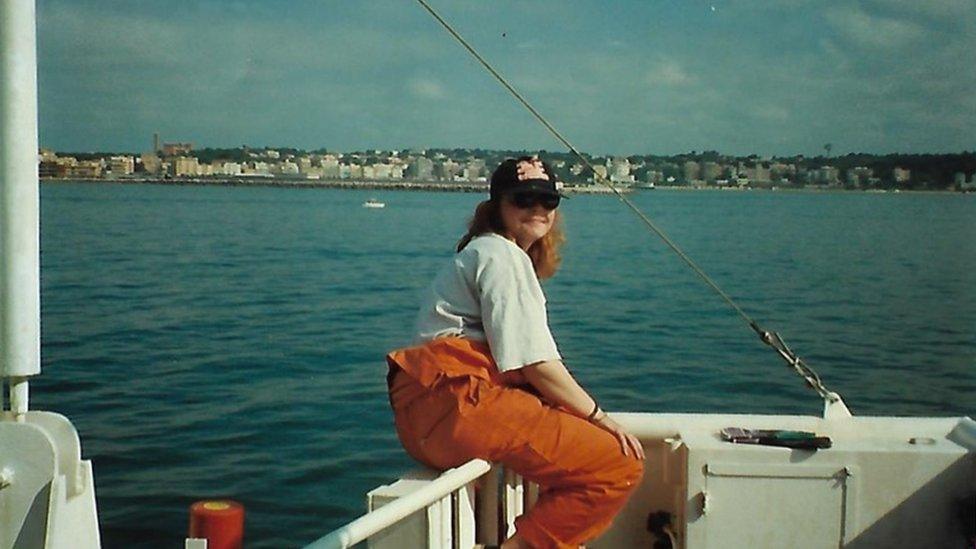
It was a decision that led George, as she prefers to be called, to spend her life at sea
I applied to 98 companies but no-one would take me - I was told I was either too old or it was because I was a woman - I was told there were no facilities onboard to accommodate me and one told me they wouldn't let a women on board as it would cause too much trouble with the men.
After eight months, I received a call and ended up as a deck cadet and when I qualified in 1995 I was the first female officer in that company. In the early years, I was usually the only female onboard full stop.
Coming into the male-dominated world of the merchant navy you had to prove you had the right to be there. On my first cargo ship, I was informed that the "captain's girlfriend" wasn't allowed on deck. So I called the crew together and introduced myself as the new chief mate - they had been expecting a man called George, which is what I prefer to be called.
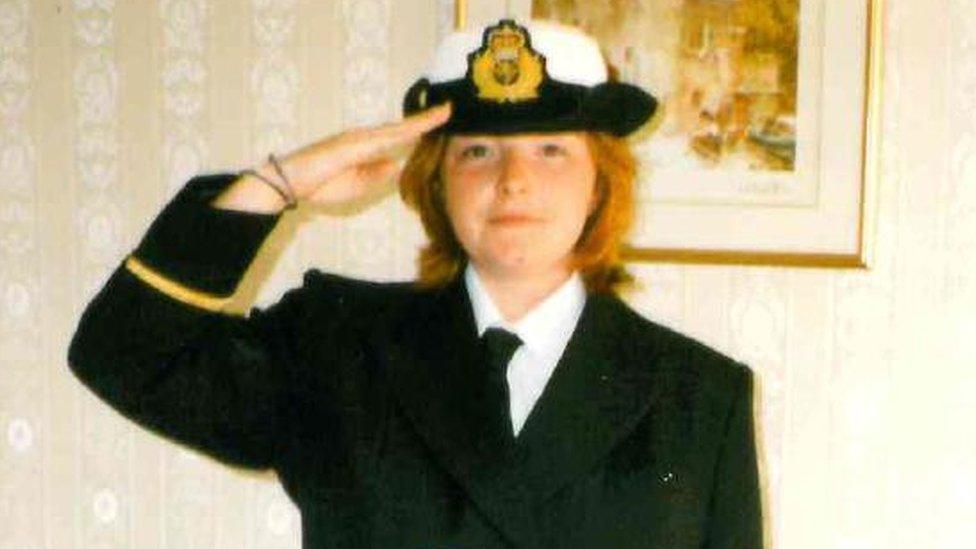
She was rejected by 98 companies before getting the call to join the merchant navy
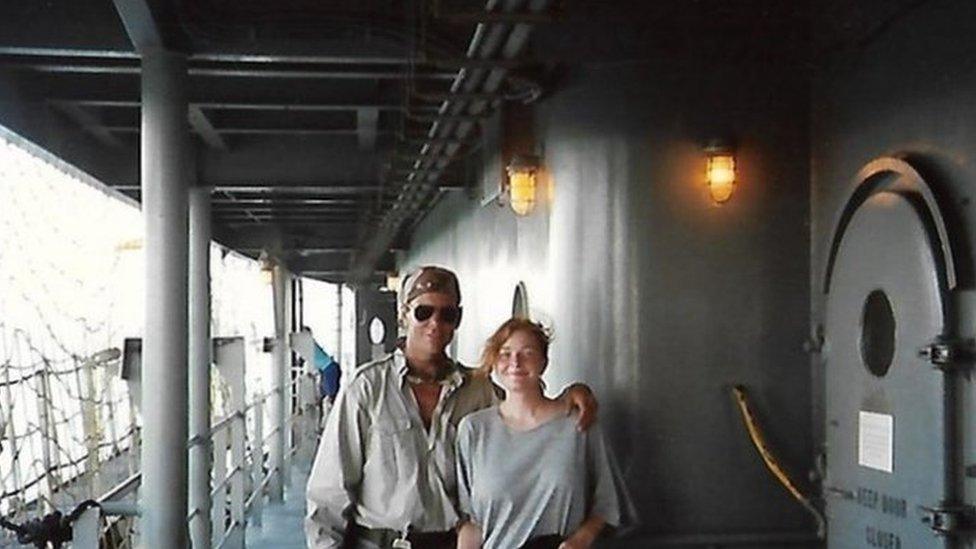
George joined the USS Gopher State as a cook in 1991
My career has taken me from the North Sea to the Baltic; to the Med the Caribbean and North and South America; to the Arctic and the Antarctic.
When I was working on the Windstar [cruise ship], as we transited to Nicaragua in the early hours we entered the area where the mobula rays are known to 'jump' as the sun rises. I was the watch-keeping chief mate and on the 4-8 shift, so there were only a few passengers about. I got a front row seat to this spectacular event as I weaved the ship through the small islands.
When I was working on the Star Princess with Princess Cruises in 2008 we were scheduled to go down to the Antarctic - at the time it was the biggest cruise ship to go there. On one of my watches I kept seeing little black spots on an iceberg. I got in a bit closer and I saw 20 to 30 penguins climbing up it. Then I could see an ice slide - they had made their own little penguin playground, they were climbing up the iceberg one by one and then sliding down.
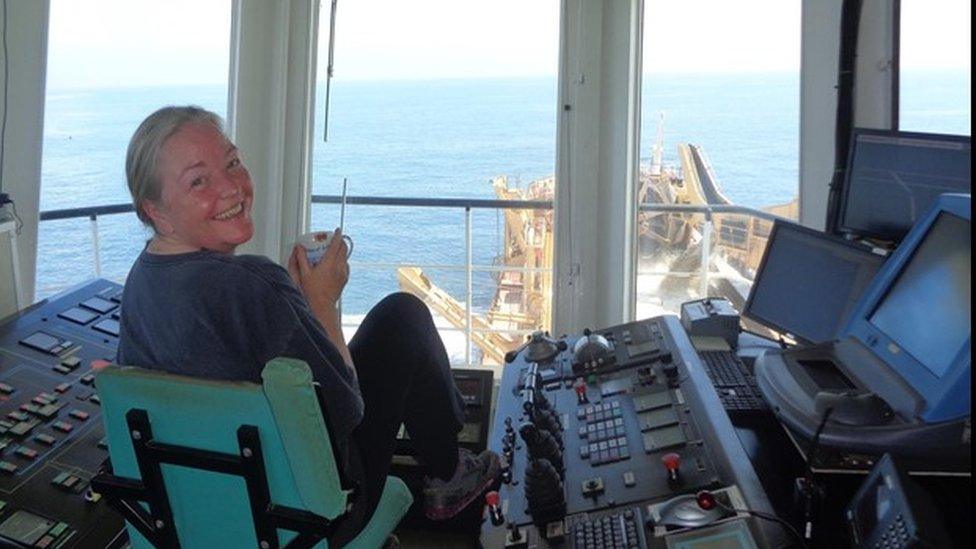
George has captained a number of ships during her career
Another time we saw some whales as we were transiting down the St Lawrence Seaway. It became apparent there were a lot of them and we didn't have safe navigational room so the captain ordered the ship to come to a stop while we waited for them to disperse. I remember seeing humpbacks, blue, minke, fin, and belugas with the odd porpoise thrown in. Apparently that year there was a flood of krill so they had all converged to feed - it was an amazing sight.
Working on the sea you got to know people you would never normally meet. I used to do a regular run in the Baltic and we would dock overnight in St Petersburg which was always a challenge - getting there involves going flat out at 40mph down a narrow channel.
One night, we went ashore to a nightclub where we met some locals and they asked if we were hungry. They took us down to a basement which was palatial, full of beautifully cut crystal and glass. Suddenly lobster, caviar and champagne arrived - there were about 10 of us on a table and when the bill arrived it was about £10 per person.
You might also be interested in:
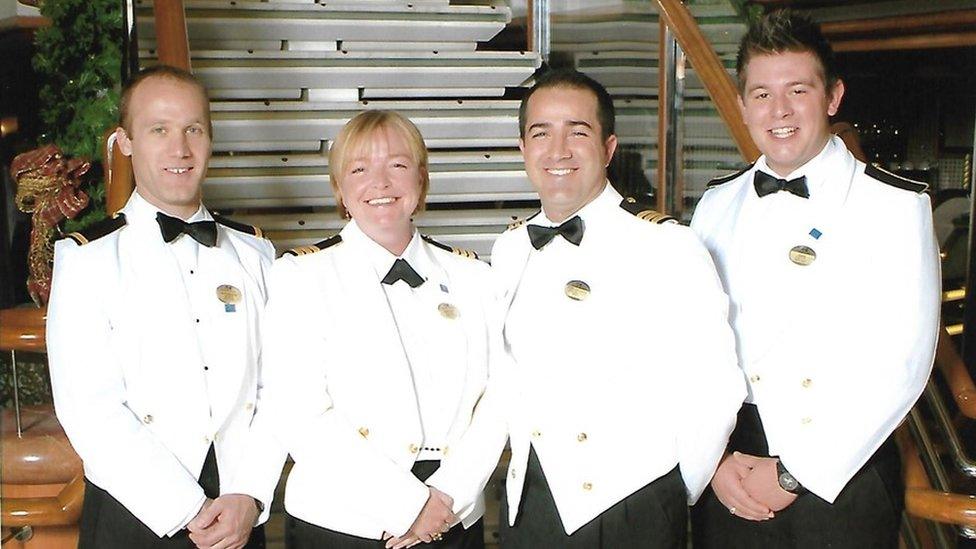
One of the best things about working on a ship is the bond between the crew members, says George
Having a family changed my outlook though, it's why I switched from "deep sea" - shipping on international routes - to "short sea". I had become the first female captain in the dredging industry in 2016 and in 2018 I was given an award for services to the industry. But after my son was born in 2013, I decided I needed shorter trips away and to be closer to home in case I needed to get back.
I had been living in Croyde in Devon for more than 20 years when the position of harbour master in Ilfracombe came up and it was a no brainer - the last time the job came around was 18 years ago. I came into post in April 2018 and became the first woman in the role.
When it was first announced, there was friction that a woman was coming in, in that there was an element of disbelief. But there is no discrimination whatsoever - as a harbour master you will help any harbour master you can, because somewhere in the country, someone will have experienced what you are going through.

Women in the maritime industry
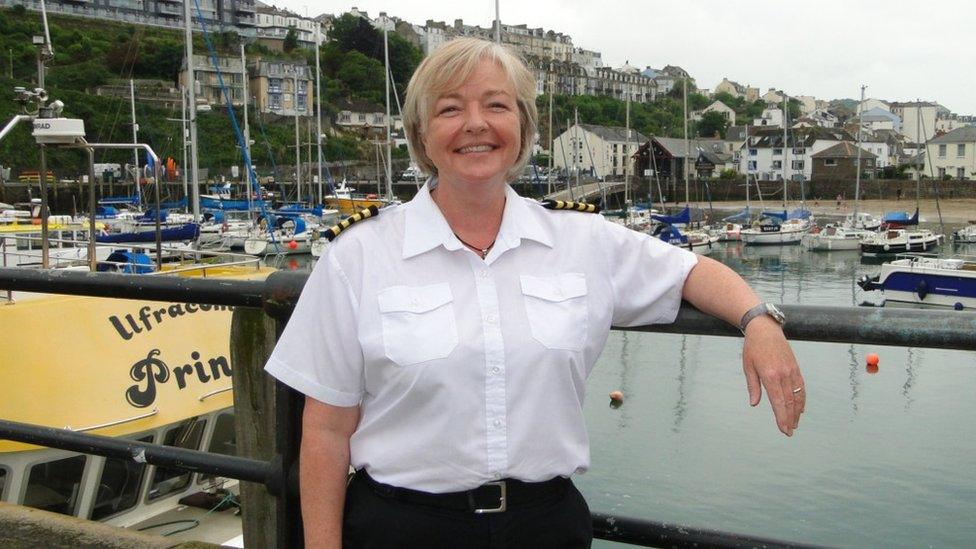
George is Ilfracombe's first female harbour master
Of the 305 harbour masters, deputies or assistants in the UK, only 17 are women, according to the Harbour Masters Association. They are "definitely in the minority", said its chief executive, Capt Martin Willis.
"However we are seeing an increase of females into this historically male-dominated industry," he added.
Department for Transport statistics show 16% of all UK seafarers active at sea in 2019 were women. A UK Chamber of Shipping spokesperson said traditionally the merchant navy "may well have been seen as a career for men, but this is changing".
The Merchant Navy Training Board is promoting careers in the industry for women by giving talks at schools and colleges and a Women in Maritime Taskforce has been established by Maritime UK to address fairness, equality and inclusion across the sector.

I don't think people realise the diversity of the job - it can range from organising the complete refurbishment of the main pier, to finding space in the harbour for the visiting boats for Lundy Race. The list is endless.
When I look back at all my companies and all the different jobs I've done, everything has led me to this one. Having a family is fantastic, it is very grounding. No matter the day on the harbour, I still go home, cook dinner, do the house jobs and read my son a story at night. He's a bit too young [to get involved] being six, but he comes with me if I have to come over and check the harbour during the Christmas break and is very good at spotting things.
Looking out of my window at the harbour office, it's one of the most beautiful places in the world - and I know, because I've been to a lot of places. I know how lucky I am. I'm 50 now but I absolutely, without a doubt, want to stay working on the sea for the rest of my working life.
As told to Charley Adams
- Published30 January 2020
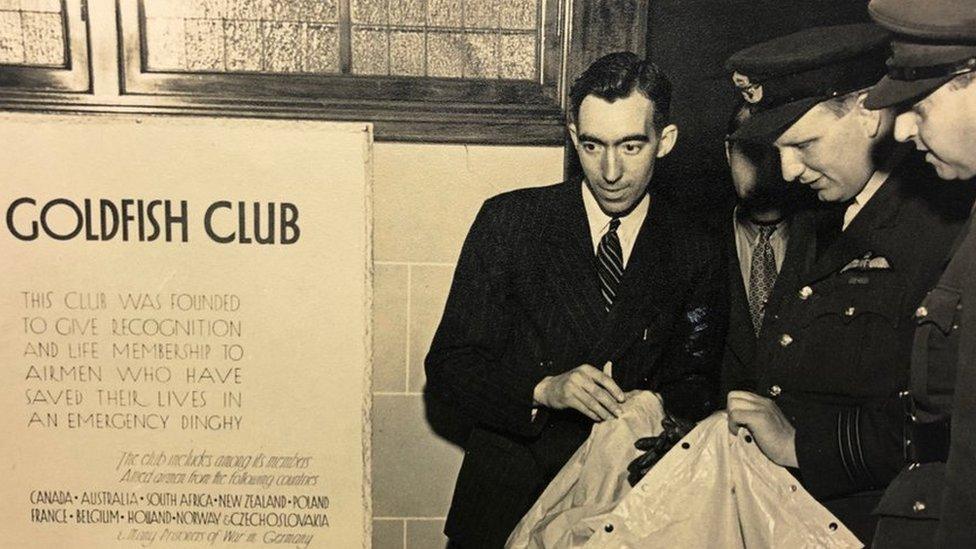
- Published28 November 2019
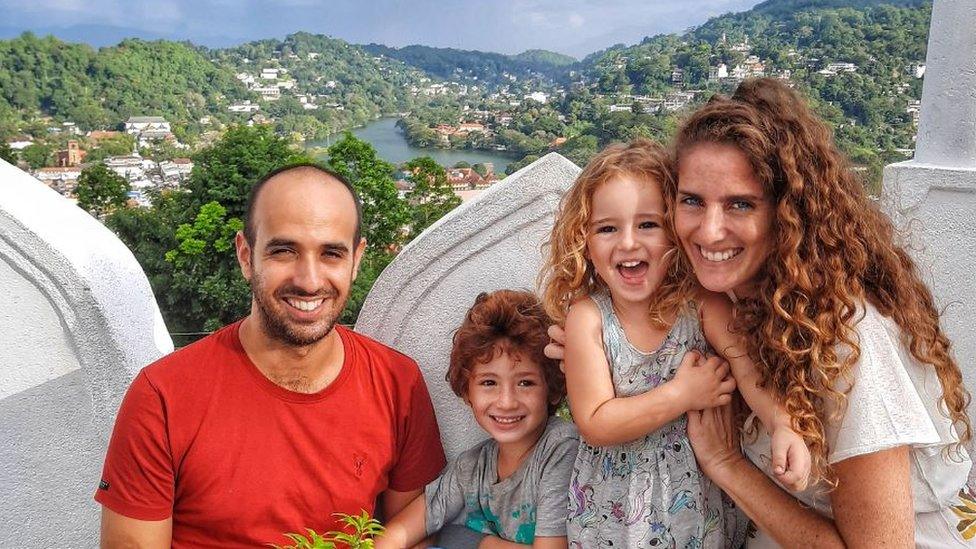
- Published11 September 2019
